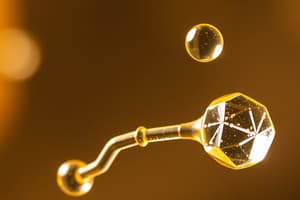Podcast
Questions and Answers
What is the primary function of macro-minerals in the body?
What is the primary function of macro-minerals in the body?
- To synthesize vitamins and hormones
- To provide energy for metabolic reactions
- To regulate body temperature
- To maintain acid-base equilibrium (correct)
Which of the following is an essential trace element?
Which of the following is an essential trace element?
- Lead
- Arsenic
- Copper (correct)
- Silicon
What is the primary advantage of using inductively coupled plasma mass spectrometry (ICP-MS) for metal analysis?
What is the primary advantage of using inductively coupled plasma mass spectrometry (ICP-MS) for metal analysis?
- It is a low-cost technique
- It is a non-destructive technique
- It is relatively free from interferences and has a wide range of elements covered (correct)
- It is highly specific for certain elements
What is the role of calcium in the body?
What is the role of calcium in the body?
Which of the following is not a function of macro-minerals?
Which of the following is not a function of macro-minerals?
What is the purpose of using atomic emission spectrometry in metal analysis?
What is the purpose of using atomic emission spectrometry in metal analysis?
What is the name of the vitamin that is also known as ascorbic acid?
What is the name of the vitamin that is also known as ascorbic acid?
Which of the following vitamins are fat-soluble?
Which of the following vitamins are fat-soluble?
Which of the following vitamins are part of the B complex?
Which of the following vitamins are part of the B complex?
What is the name of the deficiency disease caused by a lack of vitamin C?
What is the name of the deficiency disease caused by a lack of vitamin C?
What is the term for elements that are major components of body molecules?
What is the term for elements that are major components of body molecules?
What is the term for the small amounts of elements that are necessary for good health?
What is the term for the small amounts of elements that are necessary for good health?
What is the function of essential trace elements like Copper, zinc, and iron?
What is the function of essential trace elements like Copper, zinc, and iron?
Which of the following elements is stored as ferritin and hemosiderin?
Which of the following elements is stored as ferritin and hemosiderin?
What is the primary function of vitamin C?
What is the primary function of vitamin C?
Which condition is associated with iodine deficiency?
Which condition is associated with iodine deficiency?
Which vitamin is a recognized allergen and a respiratory tract irritant?
Which vitamin is a recognized allergen and a respiratory tract irritant?
What is the co-factor for more than 300 enzymes in the body?
What is the co-factor for more than 300 enzymes in the body?
Flashcards are hidden until you start studying
Study Notes
Essential Trace Elements
- Copper, zinc, and iron are essential trace elements.
- Chromium, cobalt, iodine, manganese, molybdenum, and selenium are essential ultratrace elements.
Functions of Essential Trace Elements
- Cellular respiration
- Neurotransmitter regulation
- Collagen synthesis
- Development of vascular and skeletal structures and CNS
- Protection from free radical damage
Copper
- Ceruloplasmin is a protein that transports copper.
- Wilson's disease is a condition caused by copper toxicity.
- Deficiency in copper can lead to malnutrition, Menke's syndrome (kinky hair), and other disorders.
Iron
- Iron is the fourth most abundant element in the earth's crust.
- It is stored as ferritin (soluble) and hemosiderin (insoluble).
- Transferrin is a protein that transports iron.
- Diurnal variation: iron levels are higher in the morning.
- Iron deficiency can lead to iron deficiency anemia (microcytic, hypochromic RBCs).
- Iron is a co-factor for over 300 enzymes.
Chromium
- Chromium is an important component of glucose tolerance factor.
- It potentiates insulin action and is involved in glucose and lipid metabolism.
- Cr(III) is an essential nutrient, while Cr(VI) is a recognized allergen and respiratory tract irritant.
Iodine
- Iodine is necessary for the synthesis of thyroid hormones.
- Thyrotoxicoses can occur due to iodine toxicity.
- Iodine deficiency can lead to goiter, hypothyroidism, cretinism, and congenital myxedema.
Vitamins
- Vitamins are organic compounds that occur in natural foods.
- They are classified into two groups: water-soluble (vitamins B and C) and fat-soluble (vitamins A, D, E, and K).
- Vitamins have various functions, including:
- Antioxidant functions (vitamins A, C, and E)
- Energy production (vitamins B and C)
- Blood clotting (vitamin K)
- Bone health (vitamin D)
Minerals
- Minerals are essential for various bodily functions, including:
- Providing a suitable medium for protoplasmic activity
- Regulating osmotic phenomena
- Maintaining acid-base equilibrium
- Serving as a primary component of some tissues
- Participating in enzymatic reactions
- Minerals are classified into two groups: macro-minerals (Na, K, Ca, Mg, P, Cl) and micro-minerals (essential trace elements and toxic elements).
Studying That Suits You
Use AI to generate personalized quizzes and flashcards to suit your learning preferences.



